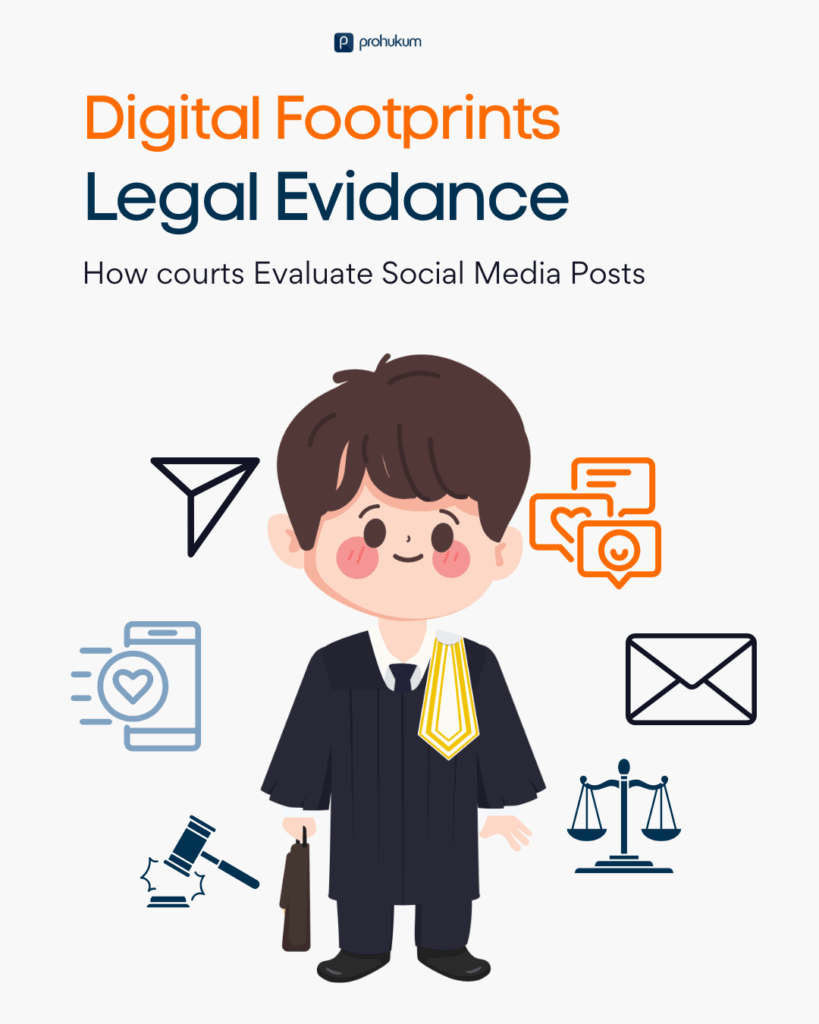In today’s digital era, people document more of their personal and professional lives on social media than ever before. Conversations that once felt casual now leave behind permanent digital footprints—and in legal settings, these traces can become crucial pieces of evidence. So, how courts evaluate social media posts in legal proceedings becomes an essential question. Are screenshots enough? Can a Facebook comment count as a confession?

This article examines how the legal system is responding to the rise of digital evidence and outlines the standards courts use to assess the authenticity and admissibility of social media content.
Digital Footprints: Between Personal Expression and Public Evidence
A digital footprint refers to all forms of online activity records, including posts, comments, direct messages, and even metadata. In the legal realm, these traces are no longer considered private. Social media has become a valuable source of information in both criminal and civil cases. For example, in divorce cases, Instagram posts might serve as evidence of infidelity or financial recklessness. In criminal investigations, Facebook posts could support allegations of intent or premeditation.
According to Electronic Evidence by Stephen Mason, modern courts are adopting a more inclusive approach toward digital evidence, including social media. However, such evidence must still meet basic standards of proof: it must be authentic, relevant, and reliable.
Authentication: The Biggest Challenge in Social Media Evidence
One of the main challenges in using social media posts as evidence is authentication. Who actually made the post? Does the account belong to the defendant? Has the content been altered?
In legal practice, courts cannot accept screenshots or copied posts at face value. A technical verification process is required, such as:
- Original metadata from the social media platform,
- Expert testimony from IT specialists who can verify file integrity,
- Or written confirmation from the platform provider (e.g., Facebook, Instagram).
In Digital Evidence and Computer Crime, Eoghan Casey emphasizes that the reliability of digital evidence depends largely on the methods used to collect and document it. Courts may reject any evidence that investigators handle carelessly as inadmissible.
Relevance and Context: A Snapshot Doesn’t Always Tell the Whole Story
Not every social media post is immediately relevant in legal proceedings. Context matters. For instance, a photo of someone on vacation might not be evidence of fleeing prosecution it could be a long-planned trip.
Digital evidence is often ambiguous and requires careful contextual interpretation. Judges must be cautious not to draw biased conclusions based solely on visual cues or persuasive narratives.
Ethics and Privacy Rights: Balancing Legal Interests and Personal Space
Using social media as evidence also triggers important ethical and legal questions: How far can the state or opposing parties go in accessing private information? In many jurisdictions, courts allow access to public posts without breaching privacy laws. However, accessing private messages or restricted content often requires a court order to remain within legal boundaries.
Brian Craig, in Cyberlaw: The Law of the Internet and Information Technology, describes the ongoing clash between individual privacy and legal interests as a constantly evolving battleground—where each case has the potential to establish new legal precedents.
Conclusion: Digital Footprints Are a Double-Edged Sword
Social media posts now do more than reflect our digital identities—they actively influence legal outcomes. Legal professionals must master how to evaluate, authenticate, and present social media evidence effectively. Meanwhile, the public should understand that anything they share online could contribute to a broader legal narrative.
Today’s courts recognize the value of digital evidence but assess it with caution. As courts evaluate social media content in both civil and criminal cases, judges rely on contextual analysis, strict authentication, and ethical diligence to ensure that digital footprints support fair and legitimate rulings.

Artikel yang bagus, jadi makin mikir dua kali sebelum posting sesuatu. Ternyata, postingan kita bisa jadi bukti hukum yang sah kalau diambil dan diautentikasi dengan benar.